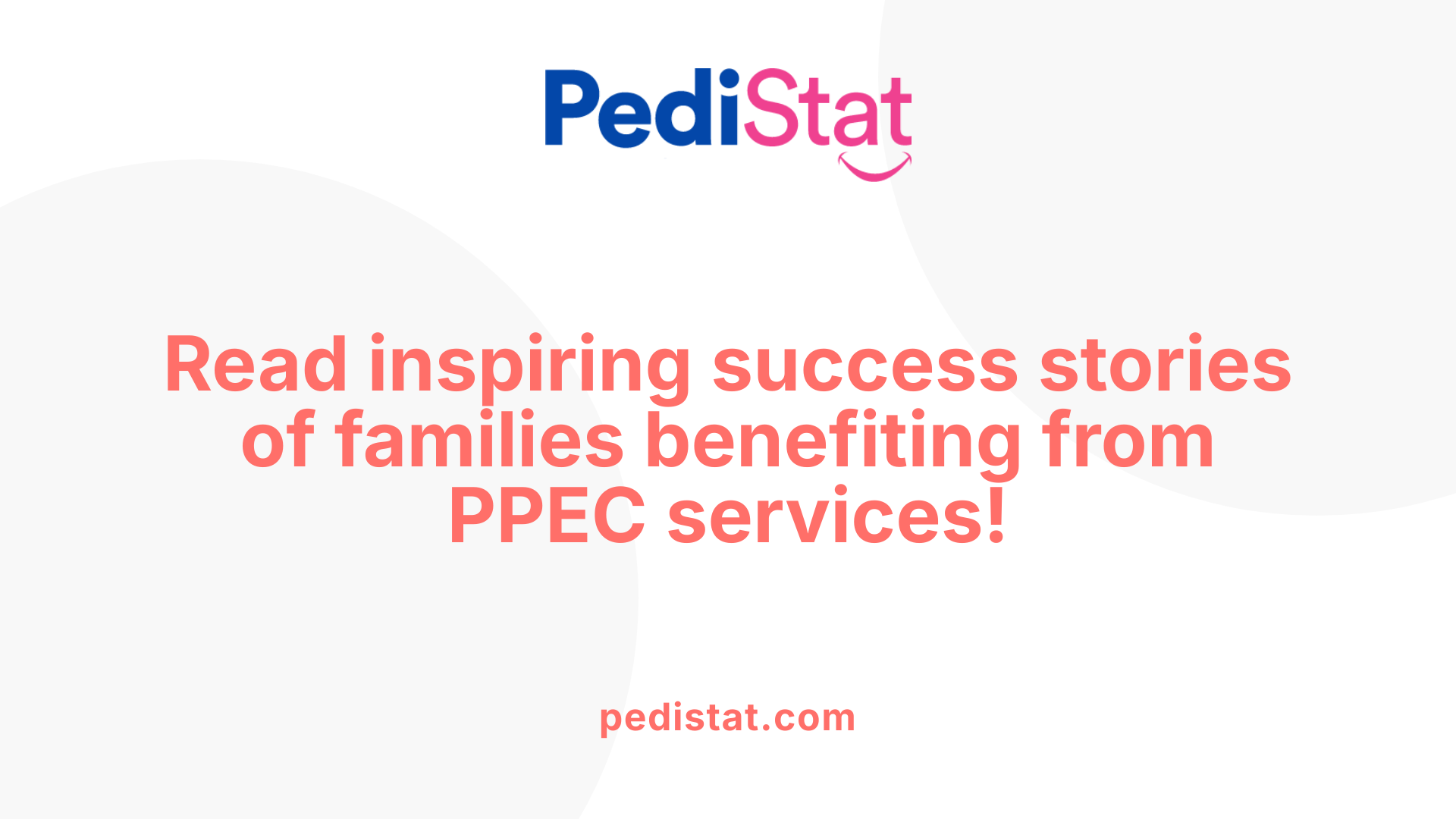How PPEC Centers Offer Adaptive Activities for Children with Special Needs

Understanding PPEC Centers and Their Adaptive Offerings
PPEC centers, or Prescribed Pediatric Extended Care centers, are a critical resource for children with special needs, offering both essential medical care and adaptive activities that support comprehensive development. These centers are designed to create nurturing environments where children with complex medical conditions can thrive physically, emotionally, and socially. This article explores the diverse adaptive activities and therapies available at PPEC centers, highlighting how these services foster growth and enhance the quality of life for children with special needs.
Adaptive Activities Tailored for Holistic Development

Role of adaptive activities in PPEC centers
Adaptive activities play a crucial role in the development of children with complex medical needs at PPEC centers. These activities are designed to be inclusive and address various developmental milestones while ensuring safety and fun. By fostering a structured environment, children can engage in essential skill-building while receiving necessary medical care.
Types of adaptive activities offered
PPEC centers incorporate a wide range of adaptive activities:
- Therapeutic play – Activities like sensory play, music, and art therapy.
- Group activities – Storytime, music classes, and holiday parties that encourage social interaction and teamwork.
- Physical exercises – Activities tailored to enhance gross and fine motor skills, such as dancing, swimming, and verbal or visual games.
- Meal sharing – Customized mealtimes that promote nutritional benefits while facilitating social engagement among children.
Benefits of adaptive activities
The benefits of these adaptive activities are significant:
- Physical development – Enhances motor skills and physical fitness, which contributes to overall health.
- Social skills – Encourages peer interaction and emotional connection, crucial for developing friendships and collaboration.
- Emotional well-being – Regular participation in adaptive activities can improve mood, alleviate anxiety, and boost confidence during medical procedures.
What types of physical activities are suitable for children with special needs?
There are several physical activities suitable for children with special needs, including dancing, swimming, martial arts, ball throwing, jumping, crawling, and walking or running. For children with autism spectrum disorder (ASD), exercise can effectively improve physical fitness, motor skills, and cognitive function, while also addressing challenges related to anxiety and social interaction. Activities that enhance gross and fine motor skills provide opportunities for practice and development, which can help reduce stereotypical and self-injurious behaviors by offering a constructive outlet for energy. Furthermore, engaging in physical activities can foster social skills by allowing children to interact with peers in a supportive environment. Overall, regular exercise can lead to better mood and sleep patterns, contributing to the overall well-being of children with special needs.
Structured Environments Promote Consistent Care

Description of Structured Environments at PPEC Centers
PPEC centers are thoughtfully designed to create safe and nurturing environments for children with complex medical needs. Facilities feature open floor plans and flexible seating arrangements that accommodate various medical equipment, fostering interaction among children. Security measures, such as secure entry systems, ensure safety while promoting a sense of community. Structured daily routines provide consistency, crucial for children who thrive on predictability.
How Structured Environments Benefit Children
Structured environments in PPEC centers offer numerous advantages for children. By integrating medical care with personalized activities, children can participate in developmental and social activities that promote emotional and cognitive growth. Regular interaction with peers during group activities enhances their social skills, boosts self-esteem, and facilitates emotional regulation. Children become more confident and engaged when they have a consistent framework for their day, allowing them to flourish both socially and medically.
Integrating Medical Care with Adaptive Activities
At PPEC centers, medical care is seamlessly blended with therapeutic and creative activities. For instance, engaged in physical therapy during play allows children to improve their mobility while enjoying themselves. Similarly, speech therapy incorporated into storytime fosters communication in a naturalistic setting. These adaptive activities ensure that while children are receiving necessary medical care, they are also participating in enriching experiences that address their complex needs holistically.
| Aspect | Benefits | Example Activities |
|---|---|---|
| Structured Environment | Provides safety, consistency, and daily routines that children thrive on. | Scheduled group activities, structured playtimes |
| Personalized Care | Individualized plans cater to specific needs of each child, ensuring effective support. | Personalized therapy sessions, tailored educational plans |
| Integration of Care | Combines medical attention with engaging activities to enhance cognitive and emotional growth. | Play-based physical therapy, interactive speech sessions |
Therapeutic and Support Services Offered at PPEC

Variety of therapies available
PPEC centers provide a broad spectrum of therapeutic services tailored to the unique needs of children with complex medical conditions. These include:
- Physical Therapy: Aimed at enhancing mobility and strength.
- Occupational Therapy: Focuses on developing daily living skills for greater independence.
- Speech Therapy: Designed to improve communication abilities.
- Respiratory Therapy: Essential for managing respiratory needs in children with breathing difficulties.
These individualized therapies are integrated into a child’s daily routine, ensuring that medical care and development go hand-in-hand.
Support services for families
In addition to therapies, PPEC centers offer robust support services for families. These include:
- Family Resource Specialists: They assist families in accessing community resources and educational options.
- Caregiver Training: Provides families the tools and knowledge to support their child's development at home.
- Support Groups: Creating a sense of community among families facing similar challenges.
Such resources are crucial for empowering families in their caregiving journeys.
Impact of therapies on development
The multifaceted approach taken by PPEC centers often leads to significant developmental progress in children. Testimonials from parents highlight improvements in:
- Emotional Regulation: Increased ability to manage feelings and respond to situations.
- Communication Skills: Enhanced interaction with peers and adults.
- Socialization: Greater confidence in social settings, contributing to a sense of belonging.
Overall, the combination of therapeutic services and family support creates a nurturing environment that promotes health, happiness, and developmental growth for children.
Balancing Medical and Social Needs in PPEC Settings

Integration of medical care and social interaction
Prescribed Pediatric Extended Care (PPEC) centers effectively blend medical daycare services with opportunities for social engagement. They provide a range of critical medical and therapeutic services, such as skilled nursing, physical therapy, and occupational therapy, all tailored to meet each child's unique health requirements. This dual focus allows children with complex medical conditions to receive necessary care while enjoying a nurturing environment where they can interact with peers.
Role of social activities in development
Social activities at PPEC centers, like structured playtime, group story sessions, and educational programs, are designed to foster interaction and social skills. These activities are not only fun but also serve as vital tools for developmental growth. They help children learn communication skills, emotional regulation, and build confidence, which are crucial for their overall growth and integration into larger society.
Impact on emotional and social well-being
Research and testimonials indicate that children who regularly engage in socialization in supportive environments experience improvements in their emotional and social well-being. They gain a sense of belonging and acceptance, which can significantly enhance their mood and quality of life. The nurturing atmosphere of PPEC centers, coupled with individualized care plans, ensures that both the medical and emotional needs of children are met, creating a comprehensive support system.
The Positive Impact of PPEC on Families and Children

Success Stories and Testimonials
Parents of children attending PPEC centers often share compelling stories about the transformative impact these facilities have on their children's lives. Many report significant improvements in health, development, and overall happiness. For instance, testimonials highlight enhanced emotional regulation and improved communication skills, thanks to the tailored therapies and supportive social environments provided by PPEC centers.
Comprehensive Care Approach
The holistic model of care at PPEC centers is crucial for addressing the multifaceted needs of children with complex medical conditions. Each child benefits from a personalized care plan designed by healthcare professionals in collaboration with the family. This ensures that medical, developmental, and emotional needs are met effectively. Services include physical therapy, occupational therapy, and speech therapy, all vital for improving children's skills and quality of life.
Family Involvement and Community Resources
Family support is a cornerstone of PPEC services. Centers like PPEC of Palm Beach offer resources and workshops that empower families, link them to community support, and provide respite care for caregivers. This holistic approach not only strengthens family bonds but also fosters a sense of community, allowing parents to share experiences and learn from each other while navigating the complexities of raising children with special needs.
Looking Forward: The Growing Role of PPEC Centers
PPEC centers stand as a beacon of hope for families and children facing the challenges of complex medical conditions. By harnessing adaptive activities and fostering holistic development, these centers not only address immediate health needs but also contribute to the long-term well-being of children. As they continue to evolve, PPEC centers will play an increasingly vital role in nurturing the potential of special needs children, providing them with the tools and opportunities they need to succeed in all aspects of life.
References
- Benefits of PPEC for Children with Special Needs - Spark Pediatrics
- A Day in the Life at a Prescribed Pediatric Extended Care (PPEC ...
- Benefits of PPECC | Viva Pediatric Heathcare
- The Best Way to Socialize Kids with Medical Complexities at PPEC ...
- The Benefits of PPEC: How It Combines Medical and ...
- Creative Day: PPEC - Easterseals of the Bluegrass
- PPEC of Palm
- Comprehensive PPEC-Daycare Services for Medically Complex ...
- Adaptive Recreation - Easterseals of the Bluegrass













